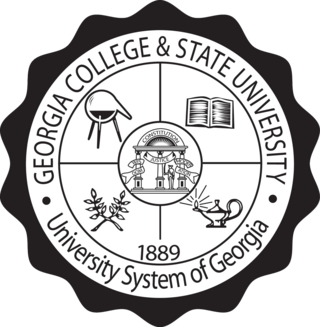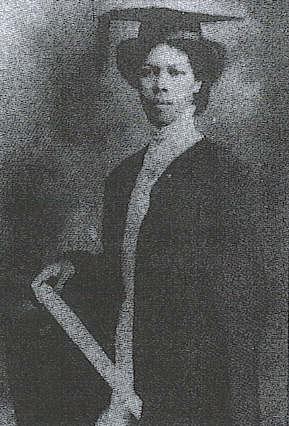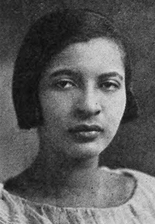
Virginia State University is a public historically Black land-grant university in Ettrick, Virginia. Founded on March 6, 1882, Virginia State developed as the United States's first fully state-supported four-year institution of higher learning for Black Americans. The university is a member school of the Thurgood Marshall College Fund.

Fairmont State University is a public university in Fairmont, West Virginia.

Georgia College & State University is a public liberal arts university in Milledgeville, Georgia. The university enrolls approximately 7,000 students and is a member of the University System of Georgia and the Council of Public Liberal Arts Colleges. Georgia College was designated Georgia's "Public Liberal Arts University" in 1996 by the Georgia Board of Regents.

In the United States, an honor society is a rank organization that recognizes excellence among peers. Numerous societies recognize various fields and circumstances. The Order of the Arrow, for example, is the National Honor Society of the Boy Scouts of America. Chiefly, the term refers to scholastic honor societies, those that recognize students who excel academically or as leaders among their peers, often within a specific academic discipline.

Ethel Hedgeman Lyle was a Founder of the Alpha Kappa Alpha Sorority (ΑΚΑ) at Howard University in 1908. It was the first sorority founded by African-American college women. Lyle is often referred to as the "Guiding Light" for the organization.

Lillie Burke was an American woman who was one of the original founders of Alpha Kappa Alpha Sorority in 1908, the first sorority founded by African-American women. Burke and her sister Beulah Burke were two of the nine cofounders.

Harriet Josephine Terry was one of the sophomores founders of 1908 of Alpha Kappa Alpha Sorority, Incorporated, the first sorority founded by African-American women. The organization has continued to generate social capital for 105 years.

Beulah Elizabeth Burke (1885–1975), was, along with her sister, Lillie, one of the nine original founders of Alpha Kappa Alpha sorority in 1908, the first sorority founded by African-American women. In her leadership as an educator and civic activist, Burke created important social capital. Her legacy of Alpha Kappa Alpha has continued to contribute to society for over 100 years.

Ethel Jones-Mowbray was one of the twenty founders of Alpha Kappa Alpha Sorority, Incorporated, the first sorority founded by African-American women. Her legacy was an organization that has helped African-American women succeed in college, prepare for leadership and organize in communities, and serve their communities in later life. The sorority has continued to generate social capital for over 112 years.

Julia Evangeline Brooks was an incorporator of Alpha Kappa Alpha Sorority, Incorporated, the first sorority founded by African-American women. The sorority has continued to generate social capital for nearly 100 years.

Nellie Pratt Russell was an incorporator of Alpha Kappa Alpha Sorority, Incorporated, the first sorority founded by African-American college women. The sorority has continued to generate social capital for over 110 years.

Margaret Flagg-Holmes was one of the sixteen founders of Alpha Kappa Alpha Sorority, Incorporated, at Howard University in Washington, DC. It was the first sorority founded by African-American women.

Lavinia Norman was one of the sixteen original founders of Alpha Kappa Alpha Sorority, Incorporated, the first sorority founded by African-American women, at Howard University. She was one of a small minority of women who attended college at all. In addition Norman did graduate work and taught at Douglas High School in Huntington, West Virginia, for more than 40 years. When teaching was considered one of the most critical and prestigious careers for a developing nation.

Nellie May Quander was an incorporator and the first international president of Alpha Kappa Alpha Sorority, Incorporated. As president for several years, she helped expand the sorority and further its support of African-American women at colleges and in communities. The sorority established a scholarship endowment in her name. The legacy of the sorority has continued to generate social capital for over 112 years.

Joanna Mary Berry Shields was one of the seven members of the sophomore class of Alpha Kappa Alpha Sorority, Incorporated, the first sorority founded by African-American women. She created a legacy that has continued to generate social capital for nearly 110 years.

Fraternities and sororities at the University of Virginia include the collegiate organizations on the grounds of the University of Virginia in Charlottesville, Virginia. First founded in the 1850s with the establishment of a number of fraternities, the system has since expanded to include sororities, professional organizations, service fraternities, honor fraternities, and cultural organizations. Fraternities and sororities have been significant to the history of the University of Virginia, including the founding of two national fraternities Kappa Sigma (ΚΣ) and Pi Kappa Alpha (ΠΚΑ).

Angie Lena Turner King was an American chemist, mathematician, and educator. King was an instructor of chemistry and mathematics at West Virginia State High School, and a professor of chemistry and mathematics at West Virginia State College in Institute.

Theodora Velma Fonteneau Rutherford was an African-American accountant, clubwoman, and college instructor. In 1960 she became the first black CPA qualified in West Virginia.

Otelia Roberta Shields Howard was an American professor of English. She taught more than twenty years at Virginia State College, and founded the school's newspaper, the Virginia Statesman.
Dr. John McNeile Hunter was an American physicist and chemist, and the third African American person to receive a PhD in physics in the United States. He spent the entirety of his career as a professor of physics at the Virginia State College, a historically Black college in Petersburg, Virginia, where he also established and served as the first chair of the college's physics department. Virginia State College's physics program was one of the first at a historically Black college in the country. Hunter's research was focused on thermionics.



















